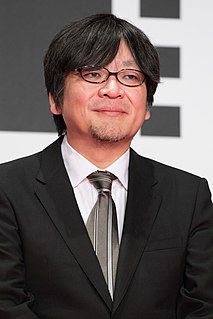A Quote by Walt Whitman
What do you think has become of the young and old men? And what do you think has become of the women and children? They are alive and well somewhere, The smallest sprout shows there is really no death, And if ever there was it led forward life, and does not wait at the end to arrest it, And ceas'd the moment life appear'd. All goes onward and outward, nothing collapses, And to die is different from what any one supposed, and luckier.
Related Quotes
For ever and ever, we say when we are young, or in our prayers. Twice, we say it. Old One, do we not? For ever and ever ... so that a thing may be for ever, a life or a love or a quest, and yet begin again, and be for ever just as before. And any ending that may seem to come is not truly an ending, but an illusion. For Time does not die, Time has neither beginning nor end, and so nothing can end or die that has once had a place in Time.
Change the emphasis, turn your attention around. If you become concerned with death, your life comes to be revealed to you for the first time, because the moment you become at ease with death you have gained a life that cannot die. The moment you have known death, you have known that life which is eternal.
Men live a moral life, either from regard to the Diving Being, or from regard to the opinion of the people in the world; and when a moral life is practised out of regard to the Divine Being, it is a spiritual life. Both appear alike in their outward form; but in their inward, they are completely different. The one saves a man, but the other does not; for he that leads a moral life out of regard to the Divine Being is led by him, but he who does so from regard to the opinion of people in the world is led by himself.
We are left with nothing but death, the irreducible fact of our own mortality. Death after a long illness we can accept with resignation. Even accidental death we can ascribe to fate. But for a man to die of no apparent cause, for a man to die simply because he is a man, brings us so close to the invisible boundary between life and death that we no longer know which side we are on. Life becomes death, and it is as if this death has owned this life all along. Death without warning. Which is to say: life stops. And it can stop at any moment.
If we desire to end our days in joy and comfort, let us lay the foundation of a comfortable death now betimes. To die well is not a thing of that light moment as some imagine: it is no easy matter. But to die well is a matter of every day. Let us daily do some good that may help us at the time of our death. Every day by repentance pull out the sting of some sin,that so when death comes, we may have nothing to do but to die. To die well is the action of the whole life.
I was deliberately trying to express how possible it might be for unmarried men and adults not blessed with biological children to become "fathers of choice." In an old-fashioned, traditional world, this might not matter. But I think that it's probably going to become terribly relevant as time goes on.
When you are young, you think that the old lament the deterioration of life because this makes it easier for them to die without regret. When you are old, you become impatient with the way in which the young applaud the most insignificant improvements … while remaining heedless of the world’s barbarism. I don’t say things have got worse; I merely say the young wouldn’t notice if they had. The old times were good because then we were young, and ignorant of how ignorant the young can be.
Family life in Western society since the time of the Old Testament has been a struggle to maintain patriarchy, male domination, and double standards in the face of a natural drift towards monogamous bonding. Young men have been called upon to prove their masculinity by their willingness to die in warfare, and young women have been called upon to prove their femininity by their willingness to die for their man. Women have been asked to appear small, dumb, and helpless so men would feel big and strong, brave, and clever. It's been a trick.
Birth leads to death, death precedes birth. So if you want to see life as it really is, it is rounded on both the sides by death. Death is the beginning and death is again the end, and life is just the illusion in between. You feel alive between two deaths; the passage joining one death to another you call life. Buddha says this is not life. This life is dukkha - misery. This life is death.
I think that the project of being alive is to be alive. So there will always be twists and turns and steps forward and steps back, but that's just your life. There is no sort of place at which to arrive, and I think that the more one focuses on an end point, the harder it is to get there. It's like the horizon, sort of ever receding, ever receding, ever receding.
Know that wherever you are in your life right now is both temporary, and exactly where you are supposed to be. You have arrived at this moment to learn what you must learn, so you can become the person you need to be to create the life you truly want. Even when life is difficult or challenging-especially when life is difficult and challenging-the present is always an opportunity for us to learn, grow, and become better than we've ever been before.
Do not fear death, but welcome it, since it too comes from nature. For just as we are young and grow old, and flourish and reach maturity, have teeth and a beard and grey hairs, conceive, become pregnant, and bring forth new life, and all the other natural processes that follow the seasons of our existence, so also do we have death. A thoughtful person will never take death lightly, impatiently, or scornfully, but will wait for it as one of life's natural processes.



































